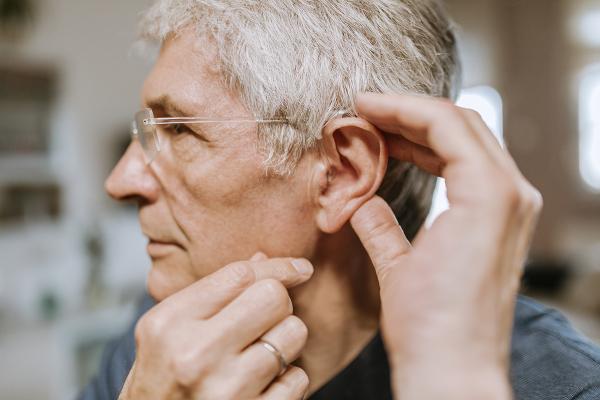
Could you be one of them?
Working with an in-network provider can help you get the hearing aids that work for you, no matter what your situation is.

So you’ve noticed that you’re not hearing as well as you used to. Maybe you struggle to follow conversations. Or it’s tough to hear the birds chirping when you’re in the backyard. Your partner or a close friend may have even mentioned it. Whatever the reason, you’re ready to get your hearing tested and treated.
Your next step? Consider seeing a hearing care professional, whether it’s an audiologist or a hearing instrument specialist.
Seeing a professional has many benefits. “It’s not just about coming in to get a hearing test for the purpose of getting a hearing aid,” says Erica Person, Au.D. She’s an audiologist and the owner of Flex Audiology in Lawrenceburg, Indiana. “We are really planning for life care along the spectrum of your hearing journey.”
With a hearing care professional, you get expert guidance all along that journey. (And working with an in-network one could also help you save money.) Here’s what to know.

Could you be one of them?
Hearing care professionals like audiologists have specialized training in hearing and balance issues.1 Because they’re so well trained, they may be able to spot underlying problems that could be contributing to hearing loss, says Person.
For example, they can check for earwax buildup and remove the excess wax.2 Or they might see signs of a medical condition like an ear infection or a ruptured eardrum. In those cases, your hearing care professional would refer you to your primary care provider (PCP) or an ear, nose and throat doctor (ENT) for treatment.
During a hearing exam and consultation, the hearing care professional tests for several things. They give you tests to see how well you hear tones. But they also test how well you hear words, with and without background noise.3
Your hearing care professional can explain your test results at the appointment. And they will be able to relate them to real-world situations, says Person.
For example, you might find out that you struggle to hear words when there’s a lot of background noise. That can help your hearing care professional figure out what types of hearing aids and technology would be the best fit for you.
And it could explain why you’re having such a hard time hearing your spouse when you’re both watching TV.
Ready to request a hearing exam and consultation? EPIC Hearing Healthcare has a wide network of hearing care professionals. Request an appointment.
“We don’t want to look at just your hearing loss,” says Person. Hearing care professionals may also ask about your vision, your overall health or your mobility issues.
Let’s say you have arthritis. You may have a tougher time handling smaller hearing aids because your fingers are stiff. So a hearing care professional could suggest a full shell, in-the-ear hearing aid.4 These devices are a bit bigger than one that goes in your ear canal, so they’re easier to put in and take out.
If you have vision loss, your hearing care professional might recommend a device with larger buttons that you can locate by touch.
Do you play tennis or spend lots of time outdoors? Do you like going to concerts or restaurants? Your hearing care professional will ask you questions about your lifestyle and hobbies to help figure out the right hearing aid for your needs.
For example, if you like hiking or camping, then maybe hearing aids with rechargeable batteries aren’t the best option, says Person.
Or maybe you take a yoga class a few times a week. Your hearing care professional can help you find devices that will stay in your ears. Are you a regular concert goer? They can program your hearing aids with a custom setting so you can hear live music more clearly.
After your first appointment, you’ll come back in to have your new hearing aids fitted. That’s when your hearing care professional will program the hearing aids. They will also show you how to put them in and take them out.5 And how to clean them.
You’ll have follow-up visits, too, depending on your health plan. These visits are good for fine-tuning your hearing aids and getting your questions answered. (EPIC Hearing covers up to 3 follow-ups, depending on the type of hearing aid you get.)
“It takes your brain about 45 days to adjust to hearing aids,” says Person. “So having someone walk you through that is key.”
You should clean your hearing aids every day. But you'll want to bring them to your hearing care professional for regular maintenance checks every 6 months or so.
That’s important because hearing aids are like little computers, says Person. Your hearing care professional will take your devices apart and clean out all the parts that you can’t reach.
They may also check for software updates from the hearing aid manufacturer. All these things can keep your hearing aids running smoothly until it’s time to replace them.
Sources
Information is for educational purposes only and is not a substitute for the advice of a licensed medical provider. Consult your provider prior to making changes to your lifestyle or health care routine.
Network size varies by market.
Hearing aids purchased in the Silver technology level will receive 1 follow-up visit.